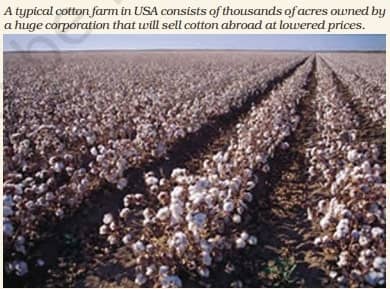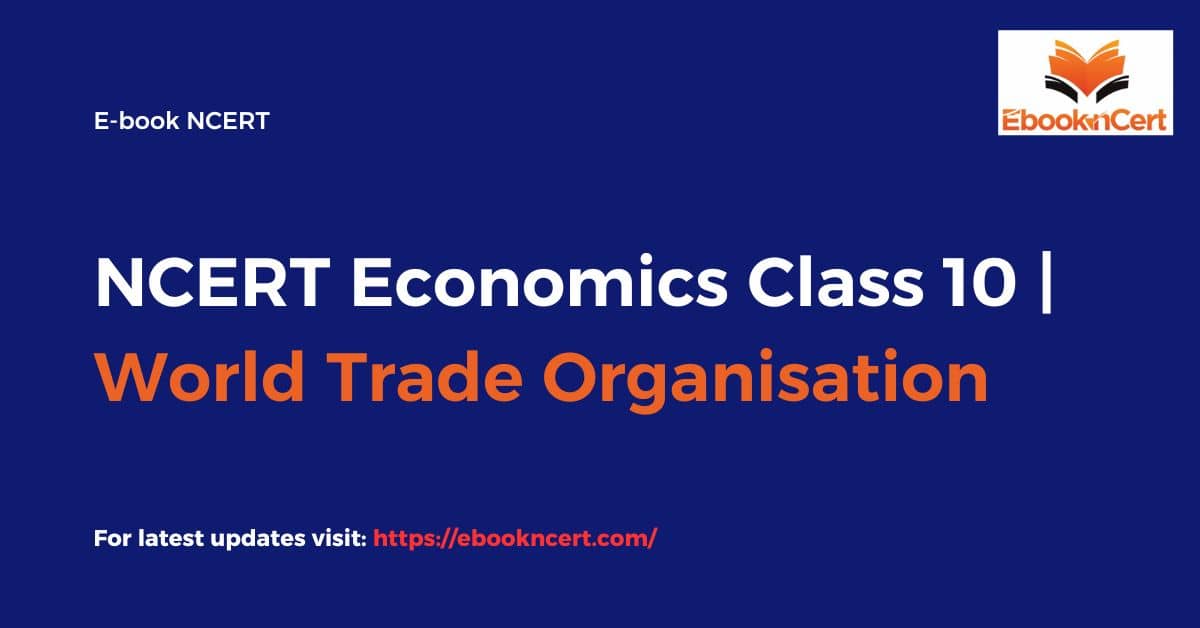Topic & sub-topics covered: World Trade Organisation: Globalisation and The Indian Economy (All single detail notes are exam-oriented).
We have discussed in-depth and exam-oriented pointers that can be asked in the board exam of class 10th about “World Trade Organisation” which is taken from the NCERT Economics notes for class 10th chapter 4 “Globalisation and The Indian Economy“.
Download the NCERT Economics for Class 10th Chapter 4 Globalisation and The Indian Economy PDF
“Download the NCERT Economics for Class 10th Chapter 4 Globalisation and The Indian Economy PDF” is essential for students. It offers insights into globalization’s impact on India’s economy, aiding comprehension of economic integration’s nuances. Students gain access to in-depth analyses, case studies, and theories, enhancing their understanding.
NCERT Class 10 Economics Chapter 4 Globalisation and the Indian Economy Class 10 Notes PDF
The PDF facilitates convenient learning, covering globalization’s historical context, theoretical frameworks, and practical implications for India. It serves as a valuable reference for educators, policymakers, researchers, and business leaders, providing a comprehensive understanding of globalization’s effects on India’s economic development. Accessing this resource empowers stakeholders to navigate globalization’s complexities effectively, fostering informed decision-making and strategic planning.
World Trade Organisation
1. Role of International Organizations:
- Powerful international organizations advocate for the liberalization of foreign trade and investment, arguing that all barriers to trade should be eliminated for the benefit of global economies.
2. Concept of Free Trade:
- These organizations promote the idea of ‘free trade,’ advocating for unrestricted trade between countries without any barriers or limitations.
3. World Trade Organization (WTO):
- The WTO is a prominent international organization dedicated to liberalizing international trade by establishing and enforcing rules governing trade relations among its member countries.
4. Objectives of WTO:
- The primary aim of the WTO is to facilitate free and fair trade by setting rules and regulations to govern international trade practices and ensuring compliance among member nations.
5. Membership of WTO:
- Currently, approximately 160 countries are members of the WTO, representing a significant portion of the global economy.
6. Disparities in Trade Barriers:
- Despite advocating for free trade, it is observed that developed countries have maintained trade barriers while imposing obligations on developing countries to remove such barriers.
7. Unequal Treatment in WTO:
- Developing countries often face pressure from WTO rules to dismantle trade barriers, while developed countries retain protectionist measures, creating an uneven playing field in global trade.
8. Implications for Developing Countries:
- Developing countries, particularly in debates on trade in agricultural products, find themselves at a disadvantage due to unequal treatment and obligations imposed by WTO rules.
9. Challenges in Achieving Free Trade:
- The persistence of trade barriers by developed countries and the unequal treatment of developing countries pose challenges to achieving the goal of free and fair global trade as advocated by the WTO.
10. Debate on Agricultural Trade:
- The current debate on trade in agricultural products highlights the disparities in trade policies and the challenges faced by developing countries in addressing trade barriers imposed by developed nations under the WTO framework.
Debate on Trade Practices

1. Disparity in Agriculture Sector:
- In India, the agriculture sector contributes significantly to employment and GDP, whereas in developed countries like the US, its contribution is minimal, with only a 1% share in GDP and 0.5% in total employment.
2. Government Support for US Farmers:
- Despite the small percentage of people engaged in agriculture, US farmers receive substantial financial support from the government for production and exports, leading to artificially low prices for their products.
3. Impact of Subsidies on Global Markets:
- The surplus farm products from the US, sold at artificially low prices due to government subsidies, flood global markets, adversely affecting farmers in other countries.
4. Developing Countries’ Concerns:
- Developing countries question the fairness of global trade, as they have reduced trade barriers as per WTO rules, while developed countries continue to provide significant financial support to their farmers, distorting market prices.
5. Call for Fair Trade Practices:
- Developing countries demand fairness in trade practices, questioning the disparity between their obligations to reduce trade barriers under WTO rules and the continued financial support provided to farmers in developed countries.
6. Impact on Farmers in Developing Countries:
- The unfair competition created by subsidized farm products from developed countries undermines the livelihoods of farmers in developing countries, who struggle to compete in global markets.
7. Compliance with WTO Rules:
- Developed countries are criticized for disregarding WTO rules by providing massive financial support to their farmers, while simultaneously pressuring developing countries to reduce support for their agricultural sectors.
8. Need for Equitable Trade Policies:
- There is a call for equitable trade policies that ensure fair competition and market access for farmers from all countries, without the distortion caused by government subsidies in developed nations.
9. Addressing Global Trade Imbalances:
- Resolving the issue of government subsidies in agriculture is essential for addressing global trade imbalances and ensuring fair and sustainable development for all countries.
10. Advocacy for Reform:
- Developing countries advocate for reforms in global trade governance to address the unequal treatment of agricultural producers and promote fair trade practices that benefit all stakeholders.

